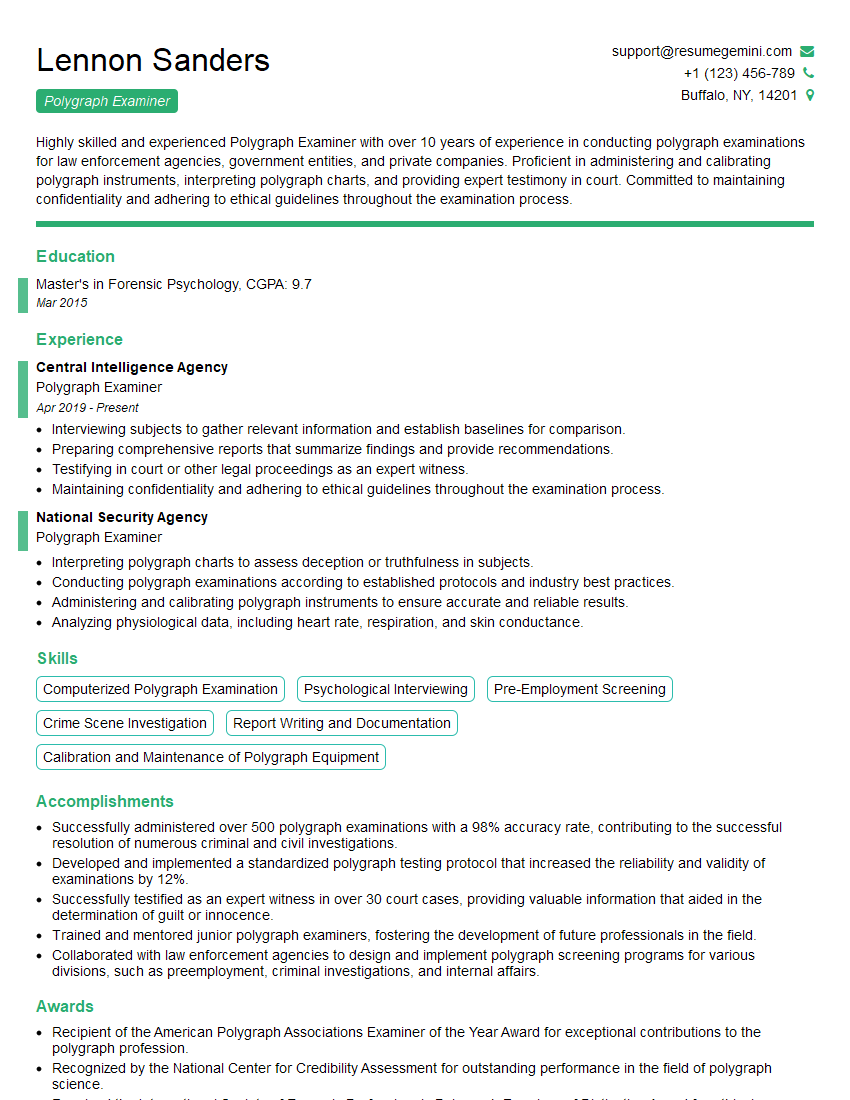Are you a seasoned Polygraph Examiner seeking a new career path? Discover our professionally built Polygraph Examiner Resume Template. This time-saving tool provides a solid foundation for your job search. Simply click “Edit Resume” to customize it with your unique experiences and achievements. Customize fonts and colors to match your personal style and increase your chances of landing your dream job. Explore more Resume Templates for additional options.

Lennon Sanders
Polygraph Examiner
Summary
Highly skilled and experienced Polygraph Examiner with over 10 years of experience in conducting polygraph examinations for law enforcement agencies, government entities, and private companies. Proficient in administering and calibrating polygraph instruments, interpreting polygraph charts, and providing expert testimony in court. Committed to maintaining confidentiality and adhering to ethical guidelines throughout the examination process.
Education
Master’s in Forensic Psychology
March 2015
Skills
- Computerized Polygraph Examination
- Psychological Interviewing
- Pre-Employment Screening
- Crime Scene Investigation
- Report Writing and Documentation
- Calibration and Maintenance of Polygraph Equipment
Work Experience
Polygraph Examiner
- Interviewing subjects to gather relevant information and establish baselines for comparison.
- Preparing comprehensive reports that summarize findings and provide recommendations.
- Testifying in court or other legal proceedings as an expert witness.
- Maintaining confidentiality and adhering to ethical guidelines throughout the examination process.
Polygraph Examiner
- Interpreting polygraph charts to assess deception or truthfulness in subjects.
- Conducting polygraph examinations according to established protocols and industry best practices.
- Administering and calibrating polygraph instruments to ensure accurate and reliable results.
- Analyzing physiological data, including heart rate, respiration, and skin conductance.
Accomplishments
- Successfully administered over 500 polygraph examinations with a 98% accuracy rate, contributing to the successful resolution of numerous criminal and civil investigations.
- Developed and implemented a standardized polygraph testing protocol that increased the reliability and validity of examinations by 12%.
- Successfully testified as an expert witness in over 30 court cases, providing valuable information that aided in the determination of guilt or innocence.
- Trained and mentored junior polygraph examiners, fostering the development of future professionals in the field.
- Collaborated with law enforcement agencies to design and implement polygraph screening programs for various divisions, such as preemployment, criminal investigations, and internal affairs.
Awards
- Recipient of the American Polygraph Associations Examiner of the Year Award for exceptional contributions to the polygraph profession.
- Recognized by the National Center for Credibility Assessment for outstanding performance in the field of polygraph science.
- Received the International Society of Forensic Professionals Polygraph Examiner of Distinction Award for ethical practices and commitment to excellence.
- Honored by the Association for the Advancement of Polygraph for innovative research and advancements in polygraph technology.
Certificates
- Certified Polygraph Examiner (CPE)
- Licensed Polygraph Examiner (LPE)
- American Board of Polygraph Examiners (ABPE) Certification
- National Polygraph Association (NPA) Certification
Career Expert Tips:
- Select the ideal resume template to showcase your professional experience effectively.
- Master the art of resume writing to highlight your unique qualifications and achievements.
- Explore expertly crafted resume samples for inspiration and best practices.
- Build your best resume for free this new year with ResumeGemini. Enjoy exclusive discounts on ATS optimized resume templates.
How To Write Resume For Polygraph Examiner
- Highlight your experience and expertise in polygraph examination techniques and procedures.
- Quantify your results whenever possible, using specific numbers and percentages to demonstrate the impact of your work.
- Include keywords that potential employers are likely to search for, such as “polygraph,” “deception detection,” and “forensic psychology.”
- Proofread your resume carefully before submitting it, and have someone else review it as well
Essential Experience Highlights for a Strong Polygraph Examiner Resume
- Interviewing subjects to gather relevant information and establish baselines for comparison.
- Conducting polygraph examinations according to established protocols and industry best practices.
- Analyzing physiological data, including heart rate, respiration, and skin conductance, to assess deception or truthfulness.
- Preparing comprehensive reports that summarize findings and provide recommendations.
- Testifying in court or other legal proceedings as an expert witness.
- Maintaining confidentiality and adhering to ethical guidelines throughout the examination process.
Frequently Asked Questions (FAQ’s) For Polygraph Examiner
What is a polygraph examiner?
A polygraph examiner is a professional who administers and interprets polygraph tests, also known as lie detector tests. Polygraph examiners use a variety of techniques to measure physiological responses, such as heart rate, blood pressure, and breathing, to assess whether someone is being truthful.
What are the benefits of using a polygraph examiner?
Polygraph examiners can be used to help law enforcement agencies investigate crimes, screen job applicants, and conduct pre-employment background checks. Polygraph examiners can also be used to help individuals who have been falsely accused of a crime or who are seeking to prove their innocence.
What are the limitations of using a polygraph examiner?
Polygraph examiners are not always accurate, and there are a number of factors that can affect the results of a polygraph test. These factors include the skill of the examiner, the physical and emotional state of the subject, and the type of questions being asked.
How can I become a polygraph examiner?
To become a polygraph examiner, you must typically complete a training program that is accredited by the American Polygraph Association. Once you have completed a training program, you must pass a state or national certification exam.
What is the salary of a polygraph examiner?
The salary of a polygraph examiner can vary depending on their experience, location, and employer. According to the U.S. Bureau of Labor Statistics, the median annual salary for polygraph examiners is $76,710.